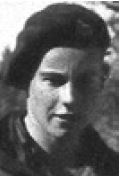Richard Cotterell died in March 2006, after a long illness bravely borne at Aldeburgh Hospital, Suffolk during March.

He was born on 28 January 1927 at Epsom, Surrey and educated at Hillside School, Reigate, Surrey and Wellington College, Berkshire.
After a brief period of service with a Home Guard Battalion of the Queen’s Own Royal West Surrey Regiment, in 1944 he was called up and enlisted into the Reconnaissance Regiment at the Regimental Training Centre, Catterick Garrison.
Upon completion of initial training, his performance and abilities during training were quickly recognised and he was posted as an instructor to the Regiment’s Battle School, Catterick.
From there he transferred to the 1st Airborne Reconnaissance Squadron. Much to his disappointment and perhaps good fortune, he remained with the Squadron’s rear party and did not drop with them at Arnhem.
Shortly after the Squadron’s return from Arnhem, the 1st Airborne Division was disbanded and he was posted to the 6th Airborne Reconnaissance Regiment, initially to Egypt and then to Palestine.
During 1945, on the disbandment of his Regiment, he, together with a number of his Regiment, were absorbed into the 3rd King’s Own Hussars, who took over its role within the 6th Airborne Division.
He served with 3KOH (mostly with ‘C’ Squadron) throughout its operational tour; preserving law and order, and participating in active operations against Jewish armed groups such as the Stern Gang and Irgun Zwei Leone (IZL). Such operations included the IZL’s raid on the Regiment’s arms store at Sarafand, and in the final stages, operations against the Arab Liberation Army.
Although comparatively young, he was quickly promoted to sergeant as Troop Sergeant, Troop Sergeant Major (as a Troop Leader) and for a time as Squadron Sergeant Major. During this time he also qualified as a parachutist.
He was Mentioned in Despatches in recognition of his leadership.
He returned to the UK with the Squadron, being among those last to leave Palestine, and briefly rejoined the Regiment before being demobilised in 1948. On being demobilised he commenced agricultural studies at The Royal Agricultural College at Cirencester.
He immediately joined the North Somerset Yeomanry (3KOH) allied Territorial Army’s allied Regiment; which also had an airborne role. Initially in the rank of sergeant and between the years 1948 until the middle sixties progressed to SSM and subsequently commissioned.
Over the next few years he served with the Yeomanry’s Squadron at Bath, which had an airborne role and on obtaining his Majority, he was appointed Squadron Leader. He served with them until about 1966 completing his Army career as 2IC of The NSY.
On resigning his commission, he continued to be involved in farming in the West Country and later organised pheasant and game shoots in both the West Country and Suffolk.
Richard was both a born soldier and countryman and was never happier than wandering through woodlands with a 12 bore under his arm. He was a keen supporter of the local churches and supported many village activities in the villages in which he lived.


